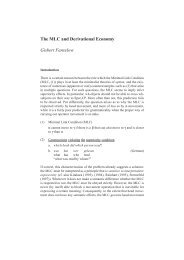Connectionist Modeling of Experience-based Effects in Sentence ...
Connectionist Modeling of Experience-based Effects in Sentence ...
Connectionist Modeling of Experience-based Effects in Sentence ...
You also want an ePaper? Increase the reach of your titles
YUMPU automatically turns print PDFs into web optimized ePapers that Google loves.
Read<strong>in</strong>g time [ms]<br />
400 600 800 1000 1200<br />
Chapter 2 Issues <strong>in</strong> Relative Clause Process<strong>in</strong>g<br />
SHORT-TERM FORGETTING 24<br />
Experiment 4 (German Eyetrack<strong>in</strong>g): grammaticality<br />
grammatical<br />
ungrammatical<br />
V3 V2 V1 Post!V1<br />
Region<br />
Figure 10. 2.7: Mean Effect read<strong>in</strong>g <strong>of</strong> the times grammaticality and 95% confidence manipulation <strong>in</strong>tervals for<strong>in</strong>the the critical German regions eyetrack<strong>in</strong>g <strong>in</strong> the German study<br />
eyetrack<strong>in</strong>g by Vasishth study et(experiment al. (2008) 4). (experiment The figure shows 4, p. the 24): effect Mean <strong>of</strong> grammaticality. read<strong>in</strong>g times and 95% confidence<br />
<strong>in</strong>tervals for the verbs and post-verbal regions.<br />
As <strong>in</strong> the German SPR study, the matrix verb V1 <strong>in</strong> the ungrammatical condition<br />
had longer read<strong>in</strong>g time than V1 <strong>in</strong> the grammatical condition. The read<strong>in</strong>g time at the<br />
2.5.2 word follow<strong>in</strong>g Expla<strong>in</strong><strong>in</strong>g V1 showed the no significant Forgett<strong>in</strong>g difference. Effect This result is <strong>in</strong>consistent with the VP-<br />
Capacity forgett<strong>in</strong>g hypothesis and consistent with the hypothesis that the middle verb’s prediction is<br />
not forgotten. Not much evidence was found for the NP-forgett<strong>in</strong>g evidence: no <strong>in</strong>terference<br />
Just effectand wasCarpenter seen <strong>in</strong> the (1992) regions explicitly preced<strong>in</strong>g mention V1, andthe atpossibility V1 the high-<strong>in</strong>terference <strong>of</strong> forgett<strong>in</strong>g certa<strong>in</strong> condition predictions<br />
showed, surpris<strong>in</strong>gly, <strong>in</strong> the CC-READER a lower read<strong>in</strong>g model time as compared “Forgett<strong>in</strong>g to by the displacement”. low-<strong>in</strong>terference condition. The underly<strong>in</strong>g<br />
mechanism Hav<strong>in</strong>gispresented equal to the prun<strong>in</strong>g experimental hypothesis results, <strong>of</strong> weGibson turn toand the Thomas <strong>in</strong>terpretation (1999), <strong>of</strong> the thusf<strong>in</strong>d mak<strong>in</strong>g<strong>in</strong>gs.<br />
basically the same predictions as the DLT-<strong>based</strong> approach described above. As has<br />
just been laid out, the VP-forgett<strong>in</strong>g Hypothesis is seem<strong>in</strong>gly not cross-l<strong>in</strong>guistically<br />
valid. Specifically, the hypothesis<br />
General<br />
has been<br />
Discussion<br />
confirmed for English but disconfirmed for<br />
German. We discuss An memory-<strong>based</strong> the NP- and explanation VP-forgett<strong>in</strong>gcould hypotheses account separately, for the language-specific beg<strong>in</strong>n<strong>in</strong>g with the difference<br />
former. <strong>in</strong>In two the ways: Englisheither experiments by postulat<strong>in</strong>g 1 and 1a awe language-dependent found no evidence consistent capacity with limitthe or a<br />
language-dependent predictions <strong>of</strong> NP-forgett<strong>in</strong>g, robustness whereas <strong>of</strong> VP <strong>in</strong> the predictions. English eyetrack<strong>in</strong>g However, study theories (experiment like DLT2) regard and<br />
memory the German processes SPR study as universally (experimentvalid. 3) we Thus, did f<strong>in</strong>dconsider<strong>in</strong>g the predicted aneffects. applicability However, <strong>of</strong>evidence the DLT<strong>based</strong><br />
<strong>in</strong>consistent hypothesis with NP <strong>in</strong> both forgett<strong>in</strong>g languages was also could found: only<strong>in</strong> mean the German SPRreaders study possess (experiment a higher 3)<br />
memory a shorter capacity read<strong>in</strong>g time thanwas English found <strong>in</strong>readers. the Post-V1 However, region there for theshould high-<strong>in</strong>terference be evidence condition, for that<br />
capacity and <strong>in</strong> the difference eyetrack<strong>in</strong>g fromstudy read<strong>in</strong>g (experiment span tasks 4) aand, shorter consider<strong>in</strong>g re-read<strong>in</strong>g work<strong>in</strong>g time was memory found capacity <strong>in</strong> the<br />
as<br />
V1<br />
doma<strong>in</strong>-unspecific,<br />
region for the high-<strong>in</strong>terference<br />
there should<br />
condition<br />
also be<br />
(compared<br />
evidence <strong>in</strong><br />
to<br />
non-l<strong>in</strong>guistic<br />
the low-<strong>in</strong>terference<br />
work<strong>in</strong>g<br />
condition).<br />
memory-<br />
Given these mixed results, it is impossible to make a strong case for NP-forgett<strong>in</strong>g as the<br />
sole explanation for the forgett<strong>in</strong>g effect, particularly s<strong>in</strong>ce VP forgett<strong>in</strong>g (discussed next)<br />
44
















